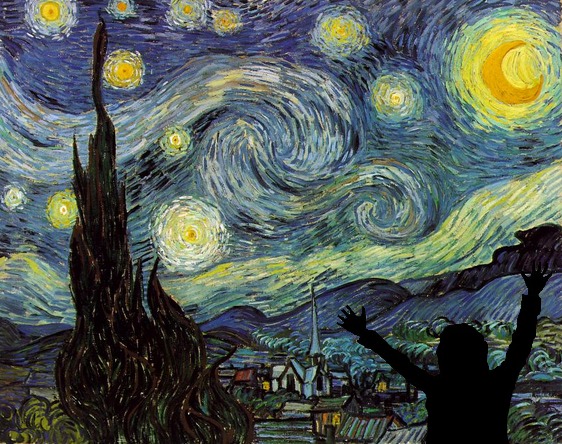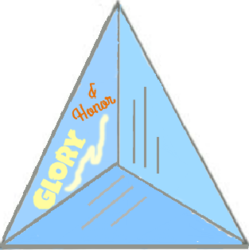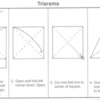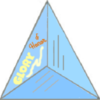Psalm 8
Lesson Set -- Updated for 2019
Overview of all workshops in this Rotation
- Art: Discuss stargazing and the wonder of God’s creation; create a crayon resist “Starry Night” painting and put themselves into the picture! (For this lesson, refer to the Writing Team Art Lesson for Psalm 8.)
- Cooking: Shape biscuit dough and recall Psalm 8:4, “the work of your hands.” Discuss how God took great care in shaping the world and each of us.
- Creative Movement: Children will contemplate the awe and wonder of God’s creation by exploring Psalm 8 through expressive movement.
- Another Art Workshop: (Because kids love Art) Illustrate adjectives that describe God while creating a prayer triorama.
Scripture Reference:
Psalm 8
Key Verse:
“O LORD, our Lord, how majestic is your name in all the earth!” Psalm 8:1a (NIV)
Rotation Objectives: After completing this Rotation, participants will be able to:
- Name that Psalm 8 is found in the Old Testament of the Bible.
- Describe two attributes of psalms: David is credited with writing many including Psalm 8; psalms are songs & prayers used to worship God.
- Share a sense of wonder for God’s amazing creation. (Discuss ways to pay attention to God’s world so as to nurture this sense of awe.)
- Compare his/her own feelings to David’s realization of how God feels about us.
Story Background Materials:
The version of Psalm 8 that we are using, a combination of NIV, CEV, and NLT…
1 O LORD, our Lord, how majestic is your name in all the earth!
You have set your glory above the heavens. (NIV)
2 With praises from children and from tiny infants, you have built a fortress.
It makes your enemies silent, and all who turn against you are left speechless. (CEV)
3 When I consider your heavens, the work of your fingers,
the moon and the stars, which you have set in place, (NIV)
4 Then I ask, “Why do you care about us humans?
Why are you concerned for us weaklings?”
5 You made us a little lower than you yourself,
And you have crowned us with glory and honor. (CEV)
6 You put us in charge of everything you made, giving us authority over all things--
7 the sheep and the cattle
and all the wild animals,
8 the birds in the sky, the fish in the sea,
and everything that swims the ocean currents. (NLT)
9 O LORD, our Lord, how majestic is your name in all the earth!
Bible Story Overview
Psalm 8 is not the sort of Bible “story” that we typically teach. There is no plot to sequence, no historical events to learn... however Psalm 8 gives us much to contemplate:
- What does it mean to revere God’s name?
- What part of God’s magnificent creation makes us say, “Wow”?
- What does this Psalm teach us about our place in God’s creation and in God’s heart?
- How should we respond to our loving, creating God?
Psalm 8 is a beautiful example of a hymn or song of praise. It begins with acclaim for God’s excellent name (or character). God can even use “tiny infants” (the weakest people) to silence enemies. The Psalmist contemplates God’s works in the heavens in awe: “the moon and the stars, which you have set in place.” This leads to thoughts of the insignificance of humans. “Why do you bother with us? Why take a second look our way?” paraphrases Eugene Peterson in The Message. The Psalmist is amazed by God’s concern (and love) for people. We are valuable to God! God considers us important! God has given us the duty of dominion over the earth. Yet, of the creatures on earth, we alone have a unique and intimate relationship with our creator God. What a humbling and also exalting experience!
What are Psalms?
The Old Testament book of Psalms is a collection of poems, prayers, and hymns used in the worship services of ancient Israel. The Psalms (also called the “Psalter") were written over a long period of time, perhaps as much as a thousand years. Scholars believe David was the author of many of the Psalms, including Psalm 8.
Over the centuries, Psalms have given us a language with which to communicate with God. The New Testament tells us that early Christians gathered and sang Psalms. Psalms are still used today in prayer and worship. What is the appeal of the book of Psalms? Various Psalmists were honestly sharing their feelings with God. Many of us receive comfort in reading the Psalms because we find words that echo our particular circumstances – from despair (Psalm 42), to praise (Psalm 100), from guilt (Psalm 51) to forgiveness (Psalm 32) and comfort (Psalm 23). Psalm 8 has been suggested as one to read, “to understand your self more clearly.” When we may not be able to form words, the Psalms speak for us; their honesty guides us to a deeper relationship with God. Author Max Lucado says Psalms are a collection “strung together by one common thread – a heart hungry for God.”
Psalm 8
Psalm 8 is a beautiful example of a hymn or song of praise. It is the first hymn of praise found in the Psalter. It is unlike any other hymn of praise in the Old Testament in that the entire Psalm is composed as a direct address to God (Mays, pg 65). Imagine David, keeping watch over a flock of sheep. It is nighttime. There is no light pollution to block the glorious twinkling of a vast canopy of moon and stars. Psalm 8 could have well been written in such circumstances. Psalm 8 reads as David’s personal conversation with God. It’s our conversation as well.
God’s majesty
Psalm 8 begins and ends with the same verse, exclaiming praise and adoration to God: “O LORD, our Lord, how majestic is your name in all the earth!” (NIV) Notice that the first “Lord” is all in capital letters. This is to show that in the original Hebrew, the Psalmist was using two different names to reveal different aspects of God’s character. “LORD” was Yahweh, the name that God used to answer Moses at the burning bush, “I AM WHO I AM”. The second “Lord” was Adonai. It would be like David saying:
O Yahweh, God who is and always will be; unchanging God; holy one …
our Adonai, loving sovereign master; protector; leader; one who cares for us …
your revealed character (your name) is majesty. In all the earth there is no one like you.
The key to the Lord’s character is his glory, which fills the whole earth (Toombs, page 263). As a shepherd, David had many opportunities to see God’s glory evident in nature. What parts of God’s creation make us stop and say, “Wow – God’s name is to be revered.” David’s awe and amazement are expressed in his words: “how majestic is your name in all the earth!”
Trusting God with child-like faith
David has praised God’s name. Now he notes that children – the weakest members of society – are God’s biggest supporters! Perhaps this is because as adults we too easily deny God? Jesus quoted verse 2 of Psalm 8 on the day of his triumphant entry into Jerusalem (Matthew 21:12-16). Jesus was in the Temple teaching and healing. Meanwhile, children were shouting “Hosanna to the Son of David.” The religious leaders were offended; they felt what the children were saying was going against God. This Jesus couldn’t be God! When they asked Jesus to silence the children, Jesus replied with, haven’t you ever read about it in Scripture? It says, “From the lips of children and infants you have ordained praise.” (NIV) God’s glory is surely evident in the way God uses the humble and the weak to carry out his work.
Our place in God’s creation
Given David’s intimate knowledge of nature we are not surprised that it leads him to view himself and all humans in light of God’s glorious creation. While marveling at the moon and the stars, the careful sculpting work of God’s fingers, David ponders, “Why do you care about us humans? Why are you concerned for us weaklings?” (CEV)
We have to remember that the Psalmist could see a few hundred stars, but with today’s technology we know about galaxies and the infinity of space. This makes it even more amazing! In light of such complexity, such beauty, and the awe and wonder at what God has created, why does God bother with us? We are small and insignificant creatures, hardly worth God’s attention. “This is a profound section for those of us (all of us, really) who periodically start thinking of ourselves, and our concerns as the absolute center of the universe. Compared to the vastness of the universe, I am nothing.” (Martin) It’s a philosophical question that could lead one to despair. It’s important to keep in mind however, that the feeling of “smallness” doesn’t come from “small compared to a big cosmos” but from the awe of God’s amazing creation. David doesn’t stop with his question of our place in the larger scheme. It’s as if he comes to a startling realization: God considers us valuable!
You made us a little lower than you yourself,
And you have crowned us with glory and honor. (CEV)
You put us in charge of everything you made,
giving us authority over all things (NLT)
God has placed us in a position of honor! God approves of us! This is both humbling and uplifting. We have a responsibility – to care for all of God’s creation. This position as viceroy of God’s earth does not belong to us but was bestowed on us as a gift by our Creator. It is good to consider: How can I pay attention to the splendor of God’s creation to gain a perspective of awe? How am I crowned with glory and honor? How will I respond to the world around me, given God’s trust in me? “God made man to be the expression of God's life … the means by which the invisible God would be made visible to his creatures. Man was to be the instrument by which God would do his work in the world and the expression of the character and being of God.” (Stedman)
Concluding reflection - Divine majesty and human dignity
Psalm 8 finishes with a repeat of the opening verse – extolling God’s majesty. The Psalmist, and now we too, have contemplated our place in God’s creation and find our selves humbled yet uplifted. “O LORD, our Lord, how majestic is your name in all the earth!"
Sources:
Bratcher, Dennis. “Introducing the Psalms.” 2005.
Constable, Thomas L. “Notes on Psalms.” 2004. Web.
Lucado, Max. Life Lessons from the Inspired Word of God – Book of Psalms. Dallas:
Word Publishing, 1997.
Martin, Lisa, et al. Postings at rotation.org discussion of Writing Team on Psalm 8. May 17–July
6, 2005.
Mays, James L. Psalms (Interpretation, a Bible Commentary for Teaching and Preaching.
Louisville, KY: John Knox Press, 1994.
Muncherian, Stephen. “How Majestic is Your Name. Index of Sermons by Text." 2001. Web. Stedman, Ray C. “God and Man. Folksongs of Faith." 1969 Web.
Toombs, Lawerence E. The Psalms. Nashville: Abingdon, 1971.
A Lesson Set written by Carol Hulbert from: First United Methodist Church, Ann Arbor, MI USA
Copyright 2009 First United Methodist Church, Ann Arbor, MI.
Permission to copy materials granted for non-commercial use provided credit is given and all cited references
remain with this material










